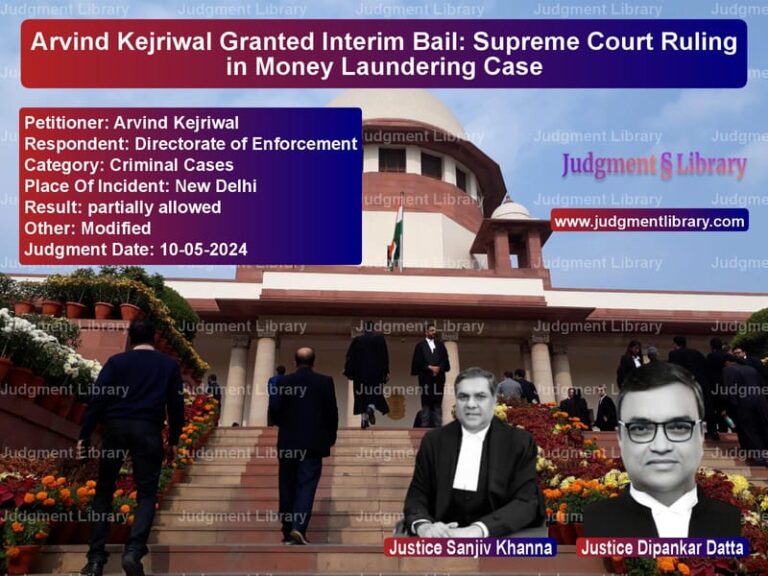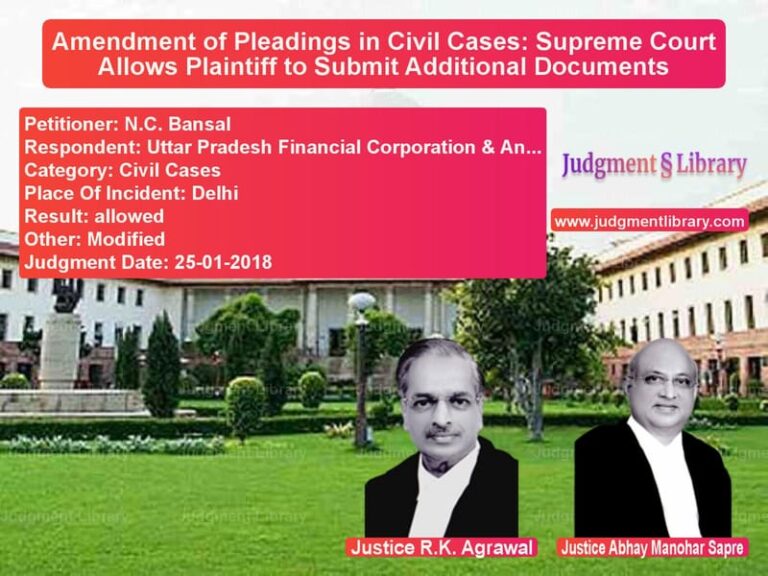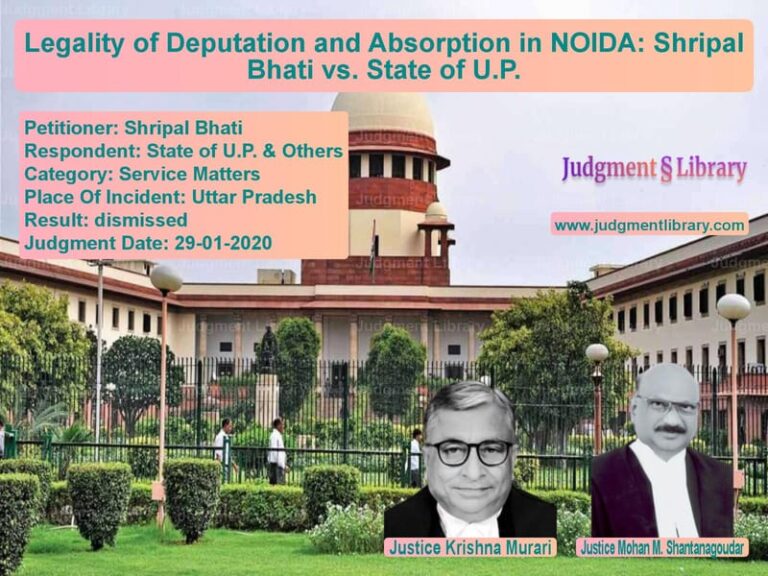Uttar Pradesh Technical Assistant Recruitment: Supreme Court Upholds Selection Process
The case of Anupal Singh & Others v. State of U.P. revolved around the selection process for the recruitment of Technical Assistant-Group-C in the Agriculture Department of Uttar Pradesh. The Supreme Court examined whether the changes in reservation category-wise vacancies made during the selection process violated the principles of fairness and transparency in public employment.
The Supreme Court ruled in favor of the government, upholding the revised requisition for category-wise vacancies and setting aside the High Court’s decision that had quashed the selection process. This judgment clarifies the legality of altering reservation quotas during a selection process and affirms the rights of selected candidates.
Background and Key Issues
The Uttar Pradesh Public Service Commission (UPPSC) issued Advertisement No. A-5, E-1/2013 on October 22, 2013, for the recruitment of 6,628 vacancies in Subordinate Agriculture Services, Cadre-III (Technical Assistant Group-C). The original advertisement listed category-wise vacancies as follows:
- Unreserved: 3,616
- Scheduled Castes (SC): 2,211
- Scheduled Tribes (ST): 235
- Other Backward Classes (OBC): 566
After the written examination was conducted, the Uttar Pradesh government revised the category-wise vacancy distribution based on a re-evaluation of cadre strength and actual working staff. The revised distribution was:
- Unreserved: 2,515
- Scheduled Castes (SC): 1,882
- Scheduled Tribes (ST): 201
- Other Backward Classes (OBC): 2,030
Following the revised notification, candidates who were unsuccessful in the final selection challenged the process in the Allahabad High Court, alleging that the state had changed the ‘rules of the game’ after the recruitment process had begun.
Arguments of the Petitioners
- The changes in category-wise vacancies after the written examination constituted an unfair alteration of the selection process.
- The revised requisition deprived 3,303 General category candidates of the opportunity to appear for interviews while benefiting 4,392 additional OBC candidates.
- The new category-wise distribution violated the 50% reservation cap, as mandated by the Supreme Court in past rulings.
- The government arbitrarily adjusted the category-wise vacancies to suit political motives rather than following established legal frameworks.
Arguments of the Respondents
- The adjustment in category-wise vacancies was necessary to rectify past errors in reservation calculations.
- The revision ensured compliance with the Uttar Pradesh Public Services (Reservation for Scheduled Castes, Scheduled Tribes, and Other Backward Classes) Act, 1994.
- The diploma holders who had been wrongly counted under the OBC category were properly adjusted under the General category, leading to changes in reservation numbers.
- Since the changes were implemented before the interviews, they did not unfairly disadvantage any candidates.
Supreme Court’s Key Observations
1. No Violation of Fair Selection Principles
“The revised requisition dated 20.08.2014 and Office Memorandum dated 12.10.2014 were only meant to rectify past mistakes in category-wise vacancies. There was no change in eligibility criteria or selection methodology, and thus, it did not violate fairness in selection.”
2. Change in Vacancies Did Not Violate Reservation Law
“The government acted within its powers to revise the reservation quota to comply with the UP Reservation Act, 1994. The revised figures were calculated based on cadre strength and statutory reservation requirements.”
3. No Change in ‘Rules of the Game’
“Revising the number of vacancies for different categories was a necessary correction, not an arbitrary change in the selection rules. The eligibility criteria remained unchanged, and the overall recruitment process followed due procedure.”
4. Candidates Cannot Challenge the Process After Participating
“Candidates who appeared for interviews with full knowledge of the revised vacancies cannot later challenge the selection process merely because they were unsuccessful.”
Final Judgment
The Supreme Court set aside the Allahabad High Court’s judgment and ruled that:
- The revised reservation quotas were legally valid.
- The selection process did not violate any statutory provisions.
- Selected candidates who had already joined the service were to continue.
- The unsuccessful candidates who filed petitions were not entitled to any relief.
- 906 candidates who were not issued appointment letters due to exceeding the permissible reservation limit were not entitled to appointment orders.
Impact of the Judgment
- Ensures Legal Compliance in Reservations: Confirms that governments can correct errors in reservation calculations without violating selection norms.
- Strengthens Stability in Public Recruitment: Prevents unnecessary litigation arising from unsuccessful candidates challenging the recruitment process after participation.
- Clarifies Application of Reservation Laws: Upholds the 50% cap on reservations while ensuring that genuine category-wise vacancies are maintained.
- Encourages Government Accountability: Mandates that future recruitment processes ensure accurate and transparent reservation calculations from the outset.
The Supreme Court’s ruling provides clarity on handling reservation quotas in public employment and sets a precedent for avoiding judicial interference in well-established selection procedures.
Petitioner Name: Anupal Singh & Others.Respondent Name: State of Uttar Pradesh.Judgment By: Justice R. Banumathi, Justice A.S. Bopanna.Place Of Incident: Uttar Pradesh.Judgment Date: 30-09-2019.
Don’t miss out on the full details! Download the complete judgment in PDF format below and gain valuable insights instantly!
Download Judgment: Anupal Singh & Other vs State of Uttar Prade Supreme Court of India Judgment Dated 30-09-2019.pdf
Direct Downlaod Judgment: Direct downlaod this Judgment
See all petitions in Recruitment Policies
See all petitions in Public Sector Employees
See all petitions in Judgment by R. Banumathi
See all petitions in Judgment by A. S. Bopanna
See all petitions in allowed
See all petitions in supreme court of India judgments September 2019
See all petitions in 2019 judgments
See all posts in Service Matters Category
See all allowed petitions in Service Matters Category
See all Dismissed petitions in Service Matters Category
See all partially allowed petitions in Service Matters Category







